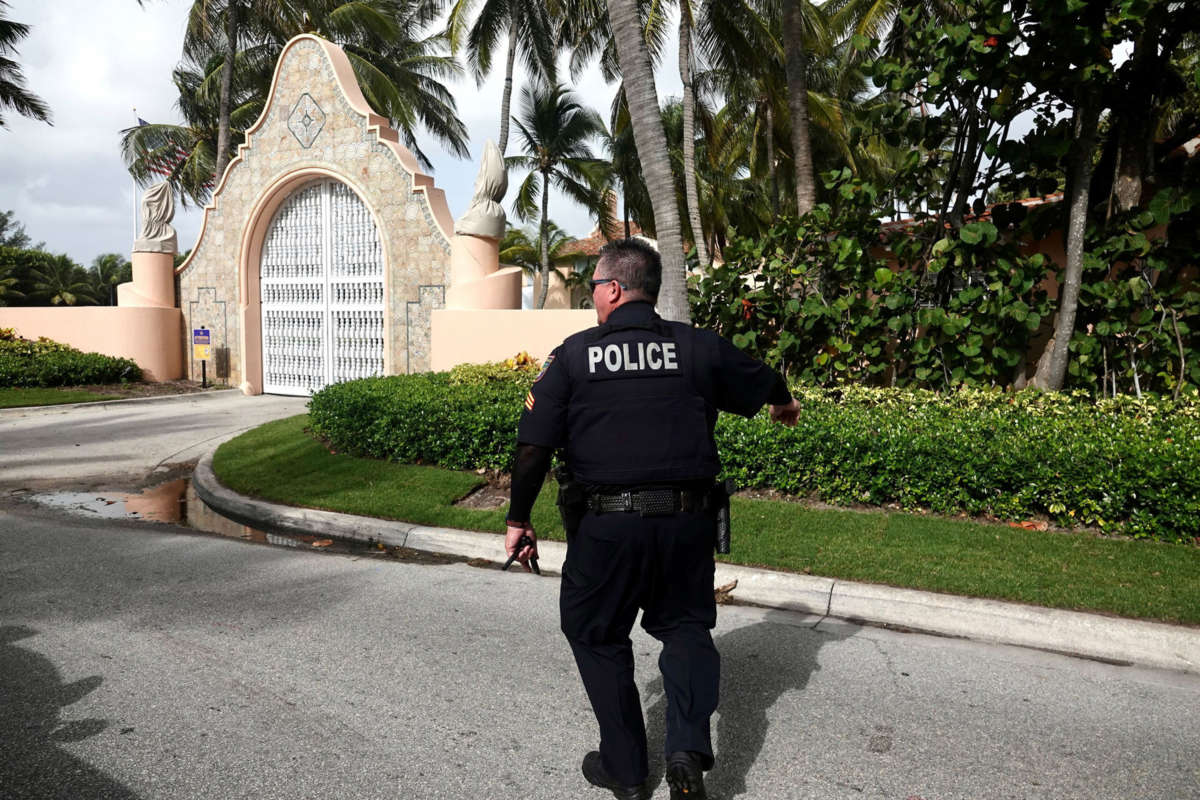Did you know that Truthout is a nonprofit and independently funded by readers like you? If you value what we do, please support our work with a donation.
The federal government has collected over 300 classified documents since the beginning of the year from former President Donald Trump’s Mar-a-Lago estate, which the former president improperly removed from the White House upon his departure from office, sources told The New York Times.
The number of retrieved documents has the potential to rise, as the Department of Justice’s (DOJ) ongoing investigation suggests that it may be uncertain whether all the documents have yet been collected, or whether Trump has more that have not been turned over yet, The Times reported.
Some of the material that has been retrieved includes documents pertaining to the FBI, the CIA and the National Security Agency (NSA), and deal with matters of national security.
The high volume of classified material suggests that Trump allies were wrong to downplay the significance of the search warrant that was executed earlier this month at Mar-a-Lago by FBI officials. Several Republicans who still align themselves with the former president have made a plethora of defenses for him, including claiming without evidence that the agency planted evidence at Trump’s home during the search, wrongly stating that Trump created a standing order to declassify any documents he took, and that the FBI overstepped its bounds in searching the property, and should have just asked for the documents in a less intrusive manner.
In fact, the evidence and events over the past year suggest that simply asking Trump to return the documents wouldn’t have worked, as federal officials have been trying to get them back for months, and only recently retrieved a larger trove of classified documents, some possibly relating to nuclear weapons.
In January, the National Archives retrieved around 150 classified documents from Mar-a-Lago, amounting to 15 boxes total, and in June, the DOJ issued a subpoena to retrieve another 26 boxes from the property. Within that subpoena, it was ordered that any other additional classified documents Trump had be immediately returned to the federal government.
But after an informer told DOJ that Trump had more documents stashed away, and after reviewing surveillance footage at Mar-a-Lago, the Justice Department filed a request for a search warrant in August, which a magistrate judge in Florida signed off on, citing “reliable evidence” based on probable cause.
After that search warrant was executed, another 20 boxes were removed from Mar-a-Lago, including 11 sets of classified documents.
According to portions of the search warrant that have been made public so far, it appears that the DOJ is looking into possible violations of the Espionage Act — a law used to prosecute individuals who (purposely or by accident) mishandle government information to the detriment of the United States’s national security interests. (The law has also been used to prosecute whistleblowers and antiwar activists.)
The Times also reported that Trump himself was familiar with the material in his possession — putting to rest another excuse by his loyalists that he simply was too rushed during his departure from Washington to examine what he was taking. In late 2021, just prior to the National Archives’s retrieval of documents, Trump personally went through the boxes of classified material he had at Mar-a-Lago, the sources told the newspaper.
“I had a security clearance prior to being in Congress,” Rep. Ted Lieu (D-California) said. “And as a Member of Congress, I have a top secret security clearance. Let me be clear: if I went through classified documents and kept 300 of them in my home, I would be arrested immediately and indicted.”
“The quantity of classified material taken — over 300 documents per the NYTimes — should make it clear this was not simply a few trinkets to show off with friends,” chimed in journalist Steven Beschloss. “No matter how many try to say this is no big deal, we’re just at the beginning of learning how deep this crime may go.”
Matching Opportunity Extended: Please support Truthout today!
Our end-of-year fundraiser is over, but our donation matching opportunity has been extended! All donations to Truthout will be matched dollar for dollar for a limited time.
Your one-time gift today will be matched immediately. Your monthly donation will be matched for the whole first year, doubling your impact.
This matching gift comes at a critical time. As Trump attempts to silence dissenting voices and oppositional nonprofits, reader support is our best defense against the right-wing agenda.
Help Truthout confront Trump’s fascism in 2026, and have your donation matched now!
